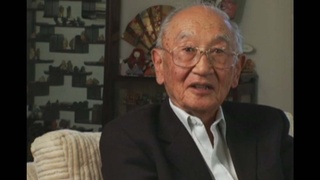Interviews
Recalling Pearl Harbor
I lived about 15 miles from Pearl Harbor, but from there you can see the air activity and the smoke and the fire.
*I: So you were at home?
And then…well yes, this was Sunday, and as we do every Sunday, we were preparing ourselves to go to church. My mother was a very, very devout Methodist. And so, I would be putting on my necktie, at that moment I recall I was putting on a necktie, because a necktie was very significant. I wore a necktie for only funerals, weddings and church. That’s all. And the same applied to shoes. I went to school barefooted. Not after that. See that was one of the big changes, I wore shoes everyday after December the 7th. It’s a big change in my life. That sound insignificant to most people but it was a significant change.
And then all of a sudden, you know while listening to the music this voice comes across, the disc jockey stops the music and he starts, you know, high-pitched voiced, talking about “This is for real, this is for real, is it not an exercise,” I go, what in the world is he talking about? “The Japanese are attacking Pearl Harbor.” Japanese…bombs are dropping. And so my father was in the next room and I went to him and I said I think you should go out there, so we went out into the street looking towards Pearl Harbor and sure enough you could see the smoke rising. And all of a sudden 3 planes flew overhead, they had made their bombing run and they were just going out to the ocean-side, and it was grey in color, with the red sun. And I knew right away, something was gonna happen to all of us. I personally thought the world that I knew was coming to an end, and it did.
*”I” indicates an interviewer.
Date: May 31, 2001
Location: California, US
Contributed by: Watase Media Arts Center, Japanese American National Museum
Explore More Videos

General Ryder’s faith in the 100th infantry battalion
(1919 - 2006) World War II and Korean War veteran


Lost respect for the flag after incarceration
(1913-2013) Doctor specializing in obstetrics in Southern California

Traumatic experiences before camp
(1913-2013) Doctor specializing in obstetrics in Southern California

Joining the hospital unit in Santa Anita Race Track
(1913-2013) Doctor specializing in obstetrics in Southern California

“Everybody went in like sheep”
(1913-2013) Doctor specializing in obstetrics in Southern California

The horror of Hiroshima after the atomic bombing (Japanese)
(1928 - 2008) Drafted into both the Japanese Imperial Army and the U.S. Army.

Finding out Roosevelt wanted Japan to attack
(1919-2020) Member of the 1800th Engineering Battalion. Promoted Japan-U.S. trade while working for Honda's export division.

Parents expected to be taken by the FBI
(1919-2020) Member of the 1800th Engineering Battalion. Promoted Japan-U.S. trade while working for Honda's export division.

525 Quartermaster Corps
(1919-2020) Member of the 1800th Engineering Battalion. Promoted Japan-U.S. trade while working for Honda's export division.

Fort McClellan soldiers
(1919-2020) Member of the 1800th Engineering Battalion. Promoted Japan-U.S. trade while working for Honda's export division.


Going to camp with the Terminal Island people
(1927-2010) Political Activist


Interned at age fifteen, I saw camp as an adventure
(1927-2010) Political Activist
